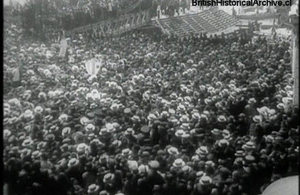Antarctica – The legacy of heroes
On the centenary of the return to Valparaiso of Pardo and Shackleton, how the achievement was eclipsed, and the importance of Antarctica today.

Image of crowd greeting the YELCHO in Valparaíso.
We all need heroes. People to inspire us. People who show us what is possible. People who push themselves beyond the normal boundaries. People who lead through their values, and their example. People like Pardo and Shackleton.
In this centenary year of the rescue by Piloto Pardo of Shackleton’s men from Elephant Island, we are all learning more about this heroes of 100 years ago. Shackleton’s great leadership of Antarctic expeditions, and overcoming tremendous odds, is well known. Pardo’s heroism in rescuing Shackleton’s crew, is less well known. Rightly, Pardo is being given greater profile in the centenary commemorations, including through films, events and talks in schools, and elsewhere. The UK is proud to be part of these celebrations.
In revisiting history, some myths always abound. One of those is that thanks were not given to Pardo, at the time. That is not true. Material, in some of the excellent exhibitions for the centenary, has shown the recognition given to Pardo and Shackleton, by both the Chilean and UK governments of the time. Pardo was offered £25 000 (a fortune at the time) as thanks by the British government, but famously declined, saying, as a naval officer and good public servant, that ‘he was only doing his duty’. Shackleton gave thanks to Pardo and the Armada de Chile (Navy) in the Preface of his book ‘South’, and at the time of the rescue, in his telegram of 3rd September 1916, to the nation, which was syndicated in newspapers across the UK. The telegram included this statement:
To the Chilian government, to Commander Pardo and to Lieutenant Aquirre, I owe my deepest thanks, for the means of rescue.
But in those days before internet, twitter and mobile phones, the story quickly became lost. Why? Partly because Shackleton’s focus had to be the immediate rescue of the Ross Sea Party stranded on the other side of Antarctica. But more generally, because other heroes intervened in the public consciousness. 100 years ago, World War I raged across Europe and beyond. What many do not realise is World War I was live on British shores. In 1916, German air ships spread terror across England, for over a year, dropping bombs on London, and they could not be stopped. On 3rd September 1916, a brave airman – Leefe Robinson, through some innovative flying and a new type of ammunition, shot down a German airship over Cuffley, north London. His action changed the course of World War I.
The public imagination was caught by his achievement, within 48 hours he was awarded the Victoria Cross – the highest, military honour ‘for gallantry’ and the fastest ever given. Crowds (reports vary from 10 000 to half a million) descended on Cuffley, to visit the site of the crash, and the feat that relieved England of the terror of the airships. That week, the British Newspaper Archives show the feat of Pardo and Shackleton, in Antarctica, received coverage in 95 articles; that of Leefe Robinson, in Cuffley, 253 articles; and the story and interest in the latter grew in the weeks following. As one of the articles puts it ‘Cuffley has suddenly leapt into overwhelming fame’.
Hence heroism of one kind, so important here in Chile, and which saved lives in Antarctica - the remotest part of the world, was eclipsed in British minds, overshadowed by heroism of another kind, much closer to home, and which saved lives in England. (And by the way, I happen to know about Leefe Robinson, because that heroism was witnessed by my father, at the time, a small boy, in Cuffley).
And so today, it is wonderful, and right, that we remember, and celebrate, the heroism of Pardo. Crowds 30 000 strong, around the British arch, here in Valparaiso, greeted the return of Pardo, Shackleton, the crew of Endurance and the crew of the Yelcho, 100 years ago. Such was the amazing achievement and the thanks for their salvation. The resilience, daring, and ingenuity of both Pardo and Shackleton inspires us all today. Without Pardo, the story of Shackleton and his men would have been very different, and one of complete disaster. It is important we remember that thanks to Pardo, we can celebrate today.
But perhaps the greatest legacy of all is the Antarctica of today. A Treaty that preserves Antarctica, in all its beauty and glory, for peace and scientific endeavour, for all mankind. A Treaty for which both the UK and Chile, were amongst the original 12 signatories. A Treaty, for which Chile hosted the Consultative Meeting of 53 nations, in May, earlier this year. And today the great white continent is still full of unknowns and challenges – its siren call of discovery still ends in tragedy for some. But through international co-operation and scientific research it is one of the great spaces of the world, to be preserved and explored, for the benefit of all. So in celebrating Pardo and Shackleton, and their achievements in Antarctica, let’s discover and find out more about Antarctica ourselves, and celebrate the future through international collaboration.
For more on Antarctica, see:
http://discoveringantarctica.org.uk.
For more on Pardo and Shackleton, see:
Fiona Clouder, Her Majesty’s Ambassador to Chile
23rd September 2016